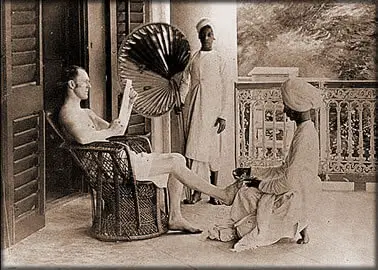Have a look.
Have a dekko
What's the meaning of the phrase 'Have a dekko'?
What's the origin of the phrase 'Have a dekko'?
Those of you who speak English but don’t live in England may not have come across this expression before and even here it is now rather archaic. Nevertheless, I like to help keep such expressions alive, so here’s the derivation…
‘Dekko’ is the usual spelling, but as it is a slang term derived from spoken language the spelling is somewhat arbitrary; sometimes ‘decko’, sometimes ‘deko’. The proper spelling, which is virtually never used, is ‘dekho’. The word, which we’ll come to later, is one of the numerous examples that the British army harvested during the period of governance of India known as the British Raj (1858 – 1947). These include the everyday words:
Avatar
Bandana, bangle, bazaar, bungalow
Cashmere, catamaran, chutney, cummerbund, curry
Dinghy, dungarees
Guru
Juggernaut
Khaki, kedgeree
Nirvana
Pundit, pyjamas
Sari, shampoo, swastika
Thug, typhoon
Yoga
Those words were assimilated into English with their (more or less) correct spelling. The British soldiery also invented other words, formed from mangled mispronunciations of the Urdu or Hindi originals:
Blighty (England) – bilāyati (foreign, especially European)
Buckshee (free, without charge) – bakhshī (giver, paymaster)
Choky (jail) – chauki (shed)
Mulligatawny (soup) – miḷaku-taṇṇi (miḷaku black pepper + taṇṇi water)
Pukka (very good) – pakkā (cooked, ripe, substantial)
The British in India also appropriated words to form new phrases in English, for example:
Hobson-jobson (a version of the call ‘Yā Ḥasan! Yā Ḥusayn!’)
Go doolally (from the place name Deolali)
Tickety-boo (from the Hindi ‘ṭhīk hai’, meaning all right)
To that list we can add ‘have a dekko’. ‘Dekho’ is a Hindi word meaning ‘look’. The expression first began to be used by the British in India in the middle of the 19th century and soon migrated back home with soldiers on leave. The phrase was originally ‘have a deck’, which derived in the same way but which has now gone out of use. ‘Have a dekko’ is first found in print in January 1856 in an appropriate place – Allen’s Indian Mail, a newspaper devoted to news of India and China aimed at the families of servicemen stationed there:
The natives of the place flock round, with open mouths and straining eyes, to have a dekko.
‘Have a dekko’ was (and is) used mostly in the London area, as are two other phrases with the same ‘have a look’ meaning – ‘have a Captain Cook‘ and ‘have a butchers’, which are both rhyming slang rather than foreign imports. ‘Take a shufti’, yet another London expression with the same meaning, is a better match for ‘have a dekko’, being a foreign word mispronounced by members of the British army, this time from the Arabic word ‘šufti’, meaning ‘have you seen?’.
Another odd-sounding phrase in the British ‘have a look’ lexicon is ‘have a gander’. This sounds as though it could be a mispronunciation of a foreign word or possibly rhyming slang. In fact, it’s neither. It merely alludes to the bird’s habit of stretching its neck high when looking for predators.
The history of “Have a dekko” in printed materials
Trend of have a dekko in printed material over time
Browse more Phrases
About the Author

Phrases & Meanings
A-Z
A B C D E F G H I J K L M N O P Q R S T UV W XYZ
Categories
American Animals Australian Bible Body Colour Conflict Death Devil Dogs Emotions Euphemism Family Fashion Food French Horses ‘Jack’ Luck Money Military Music Names Nature Nautical Numbers Politics Religion Shakespeare Stupidity Entertainment Weather Women Work
How did we do?
Have you spotted something that needs updated on this page? We review all feedback we receive to ensure that we provide the most accurate and up to date information on phrases.
